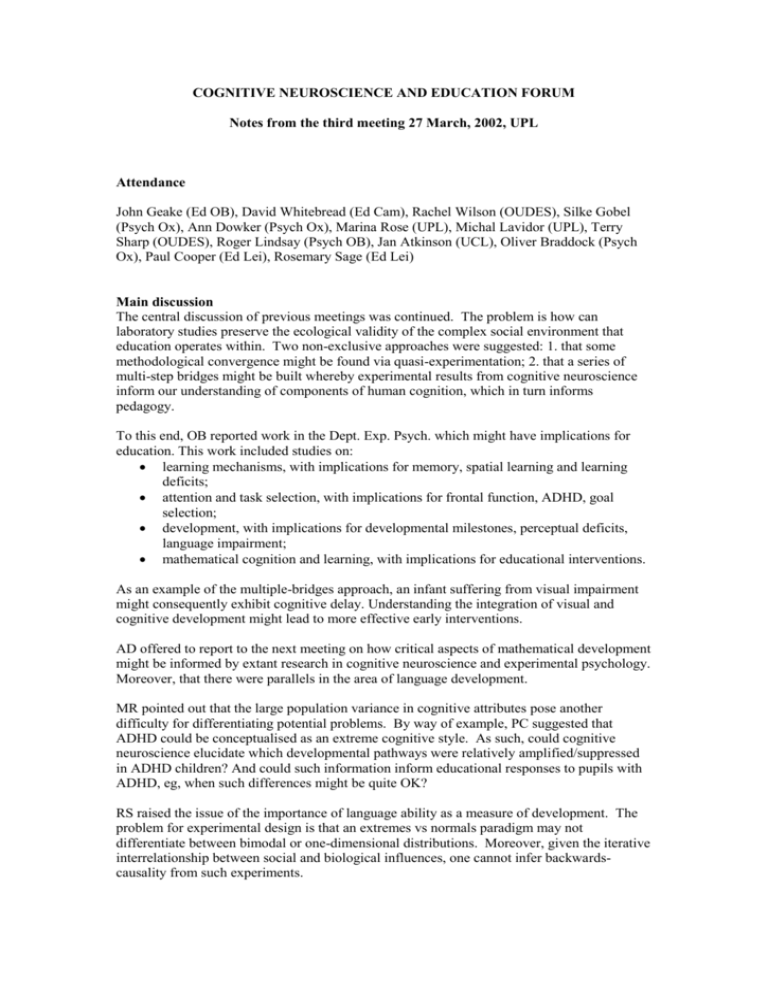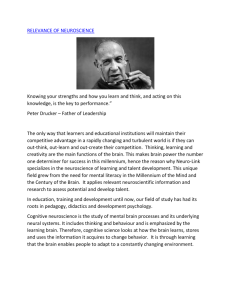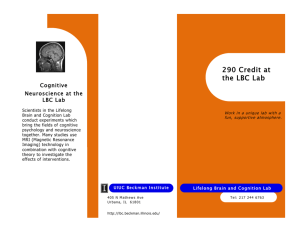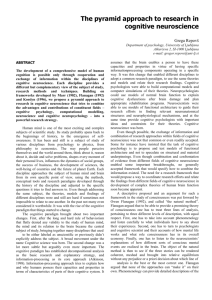ed-neuro forum notes - Oxford Brookes University
advertisement

COGNITIVE NEUROSCIENCE AND EDUCATION FORUM Notes from the third meeting 27 March, 2002, UPL Attendance John Geake (Ed OB), David Whitebread (Ed Cam), Rachel Wilson (OUDES), Silke Gobel (Psych Ox), Ann Dowker (Psych Ox), Marina Rose (UPL), Michal Lavidor (UPL), Terry Sharp (OUDES), Roger Lindsay (Psych OB), Jan Atkinson (UCL), Oliver Braddock (Psych Ox), Paul Cooper (Ed Lei), Rosemary Sage (Ed Lei) Main discussion The central discussion of previous meetings was continued. The problem is how can laboratory studies preserve the ecological validity of the complex social environment that education operates within. Two non-exclusive approaches were suggested: 1. that some methodological convergence might be found via quasi-experimentation; 2. that a series of multi-step bridges might be built whereby experimental results from cognitive neuroscience inform our understanding of components of human cognition, which in turn informs pedagogy. To this end, OB reported work in the Dept. Exp. Psych. which might have implications for education. This work included studies on: learning mechanisms, with implications for memory, spatial learning and learning deficits; attention and task selection, with implications for frontal function, ADHD, goal selection; development, with implications for developmental milestones, perceptual deficits, language impairment; mathematical cognition and learning, with implications for educational interventions. As an example of the multiple-bridges approach, an infant suffering from visual impairment might consequently exhibit cognitive delay. Understanding the integration of visual and cognitive development might lead to more effective early interventions. AD offered to report to the next meeting on how critical aspects of mathematical development might be informed by extant research in cognitive neuroscience and experimental psychology. Moreover, that there were parallels in the area of language development. MR pointed out that the large population variance in cognitive attributes pose another difficulty for differentiating potential problems. By way of example, PC suggested that ADHD could be conceptualised as an extreme cognitive style. As such, could cognitive neuroscience elucidate which developmental pathways were relatively amplified/suppressed in ADHD children? And could such information inform educational responses to pupils with ADHD, eg, when such differences might be quite OK? RS raised the issue of the importance of language ability as a measure of development. The problem for experimental design is that an extremes vs normals paradigm may not differentiate between bimodal or one-dimensional distributions. Moreover, given the iterative interrelationship between social and biological influences, one cannot infer backwardscausality from such experiments. Further to this line of argument, RL drew attention to experiments in psychology on reversal of line-centring and reading Hebrew which suggest that social biases affect lateral development. RL pointed to other experiments in implicit learning which might have implications for fostering implicit learning in the classroom, eg, in learning a second language. However, the convergence in recent years of cognitive neuroscience and experimental psychology has not been replicated with education, where there is still a wide gap. This could possibly be reduced through studies comparing cognitive behaviours of syndrome sufferers with those of normal younger children. By way of advancing ideas for possible scientific studies, RW suggested that classroom-based implicit learning tasks might make suitable criterion tasks in experimental cognitive neuroscience. Other topics discussed RW pointed out that the British Research Funding Councils are promoting interdisciplinary research proposals through their inter-council funding network. Also, the ESRC has funding priority networks, currently seeking bids for projects which grow out of currently funded research. A proposal from the Forum could be submitted under the theme of “Knowledge, communication and learning”, the extension being interdisciplinary experimental psychology and cognitive neuroscience with an education rationale. It was decided to consider proposals for ESRC funding at the next meeting. It was decided to apply to the British Education Research Association (BERA) Annual Conference at the University of Exeter, September, to hold a Symposium on Brain Research and Education, JG to co-ordinate and chair, with paper presentations from JG, PC, RS, DW, RL. Next meeting to be held before the end of this term, preferably in June. John Geake 25 June 2002








